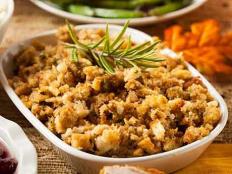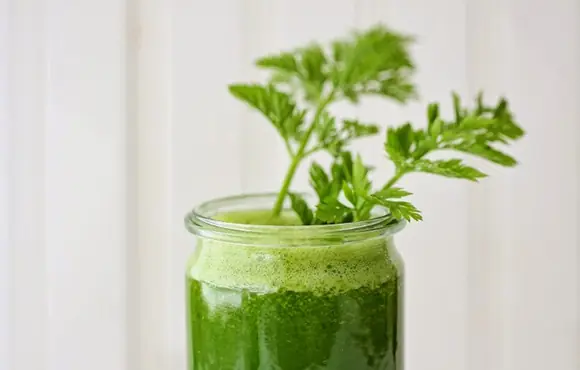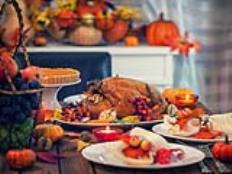Does the thought of indulging in holiday fare make you want to stockpile celebrity diet plans for when January 1 rolls around? Whether it's appetizers at the office party, drinks with friends after work, family holiday parties or those irresistible peppermint coffee drinks and pumpkin bread, extra snacking is inevitable this time of year.
But here's the thing: You can still enjoy eating this holiday season without feeling miserable each time you get up from the table. These helpful tips will encourage you to make wiser choices and prevent you from overeating, while still having your favorite treats.
Feed yourself well.
1 of 13
Sticking with a balanced, healthy nutrition plan during the holidays is one of the best things you can do to prevent overeating. By staying the course, you are less likely to starve yourself early in the day in preparation for a special dinner that night. Psychology of eating expert Karen R. Koenig, MEd, LCSW and Intuitive Eating counselor Paige O'Mahoney, M.D. both say this method of "saving calories" will only make you more hungry and less likely to eat in a mindful way.
Instead, eat nutritious foods when you are hungry during the day to prevent cravings and overeating at night.
Find More:
Nutrition TipsGive yourself permission to eat your favorite holiday foods--in moderation.
2 of 13
The holidays are a great time to give yourself permission to ditch the "all or nothing" mentality. Sticking to a diet or healthy eating plan over the next several weeks is not unrealistic, as long as you build in room for moderation.
According to O'Mahoney and Koenig, if you savor special foods mindfully and ditch the guilt, it's easier to refrain from seconds.
Find More:
Nutrition TipsGrab an apple.
3 of 13
You know how they say never go grocery shopping on an empty stomach? The same concept applies to our favorite potlucks. "If you fill up your stomach even just a bit with a healthy snack like an apple, side salad or a piece of whole wheat toast, you'll be more likely to listen to those promptings in your body to eat reasonably," explains Anna Mason, Registered Dietician Nutritionist. "But if you show up ravenous, those cheesy potatoes may find their way to your plate by the pound."
Find More:
Nutrition TipsEat until you are satisfied, not until you are full.
4 of 13
At holiday gatherings, we often take on a "food shoveling" mentality when we see so many of our favorite seasonal foods on the counter. That's why Mason recommends you go in with a goal of eating until you hit satiety.
"It's when you push past the satiety line that you approach bloating and discomfort," she explains. "Listen to your body and remember to stop before you feel stuffed and if you're still hungry later, you can always eat again."
Find More:
Nutrition TipsUse a small plate.
5 of 13
We have a tendency to fill our plates—no matter the size. Mason says one way to help overeating is to choose a kid's size plate. "If you eat all the food and are still hungry, then feel free to go back for more," she says. "There is no shame in needing to eat more food to be satisfied."
Find More:
Nutrition TipsAim for balance.
6 of 13
"As always, our ideal plate ratio is half a plate of fruits and veggies and the other half protein and grains," Mason says. So go ahead and give yourself permission to grab your favorite foods, but always balance them with other food groups to fill out your nutrient profile.
Find More:
Nutrition TipsMake wise drink choices.
7 of 13
On a day when the food runs pretty heavy, try to go heavy on the water, too. "Eating and drinking your calories can add up fast, so I recommend taking a pass on the sugary drinks and keeping alcohol to a glass or two," Mason says.
Find More:
Nutrition TipsWhen in doubt, distract yourself.
8 of 13
It's easy (and very tempting) to stay where the food is, even after you've finished eating. So instead of racking up hundreds of extra calories with mindless nibbling, step away from the table or buffet area and go for a walk or wash the dishes instead.
Find More:
Nutrition TipsFreeze the leftovers.
9 of 13
Instead of stocking your fridge full of tempting foods, freeze the second helpings for a later meal. The same goes for cookies, pies and even chocolate. Consider transferring the trays of treats you bring home from work or cookie exchange parties right into Ziploc bags and drop them in the freezer. Out of sight, out of mind.
Find More:
Nutrition TipsAvoid guilt and shame about what or how much you're eating.
10 of 13
O'Mahoney and Koenig warn that guilt and overeating can actually trigger "reactive overeating," where you're eating because you feel like you already messed up anyway. Instead, stay present and mindful as you're eating and stop when you've had enough.
Find More:
Nutrition TipsGo light the next day.
11 of 13
If you wake up with the dreaded "food hangover," plan on going light on the heavy foods that day. Start your morning off with lots of water and a cup of hot tea. Graze on fruits, vegetables and protein and stay away from sugars and processed foods. You should feel less bloated by the end of the night.
Find More:
Nutrition TipsSpeak kindly and enlist help.
12 of 13
"Plan exactly what to say to yourself if you overeat or get discouraged and how you will talk yourself through getting back on track," explains O'Mahoney and Koeing. Consider talking with your doctor, registered dietitian, therapist or wellness coach so that you can have ongoing support and a plan for success when you need it.
Find More:
Nutrition TipsAbout the Author







Discuss This Article